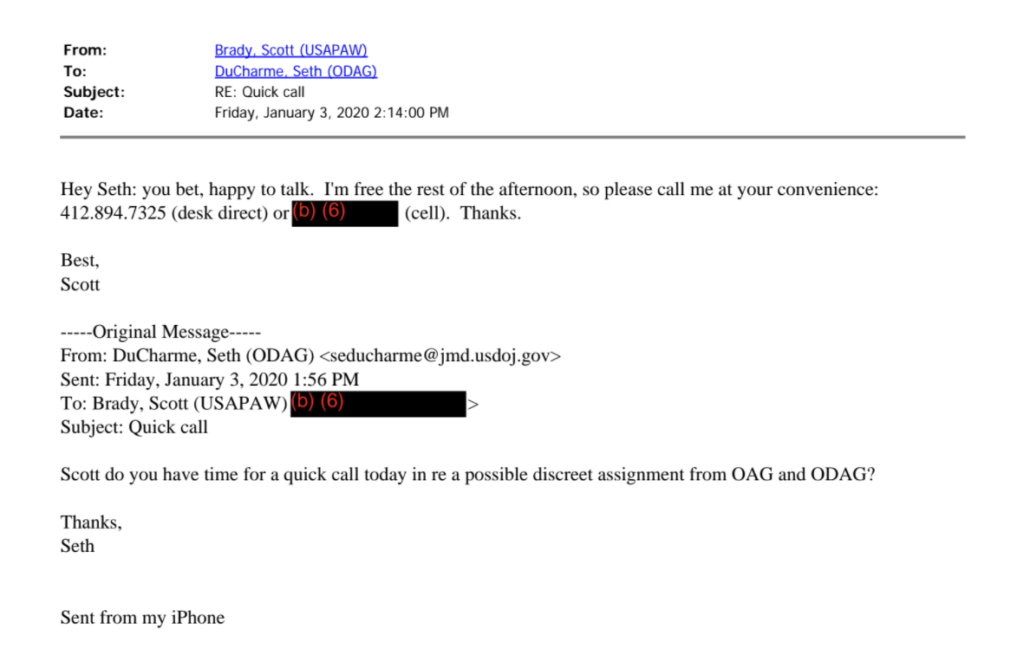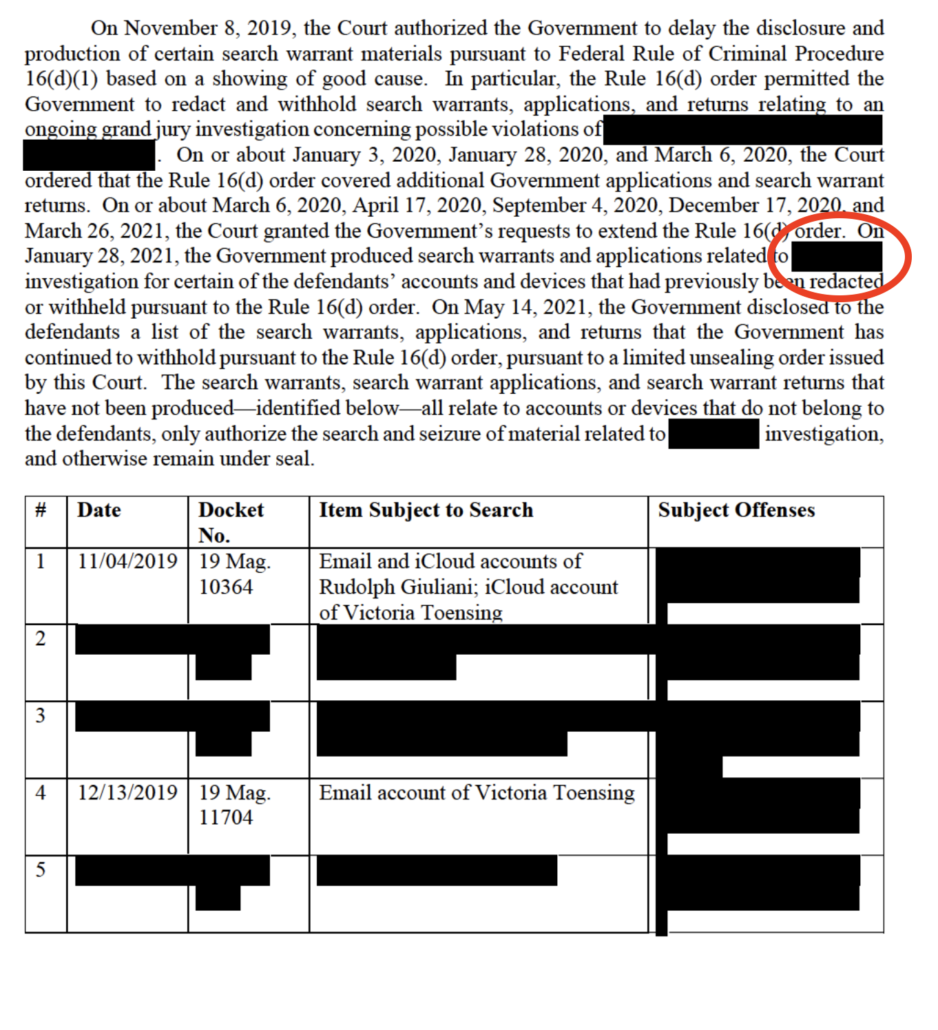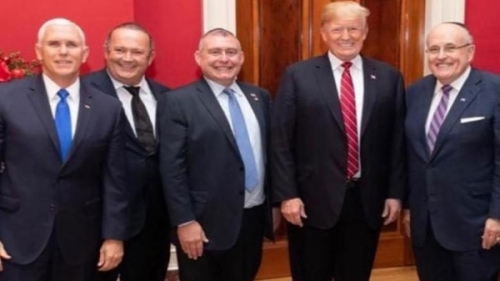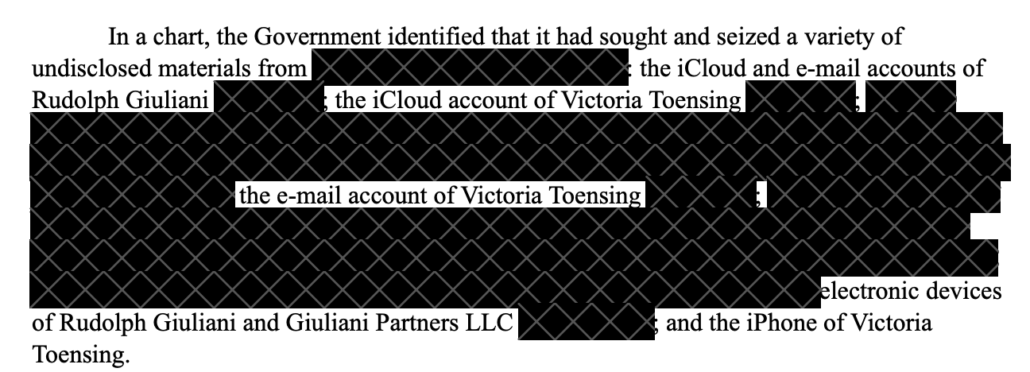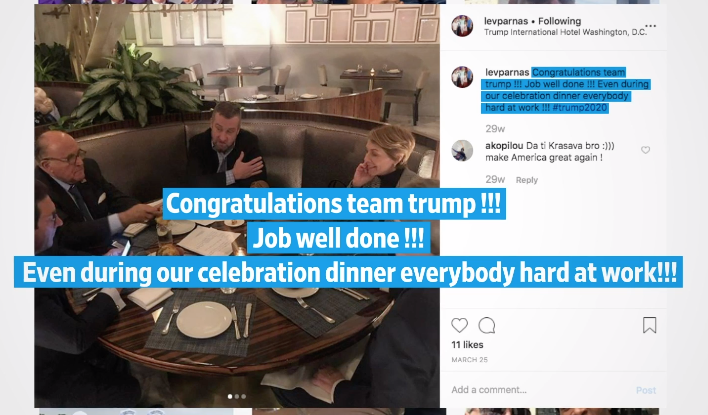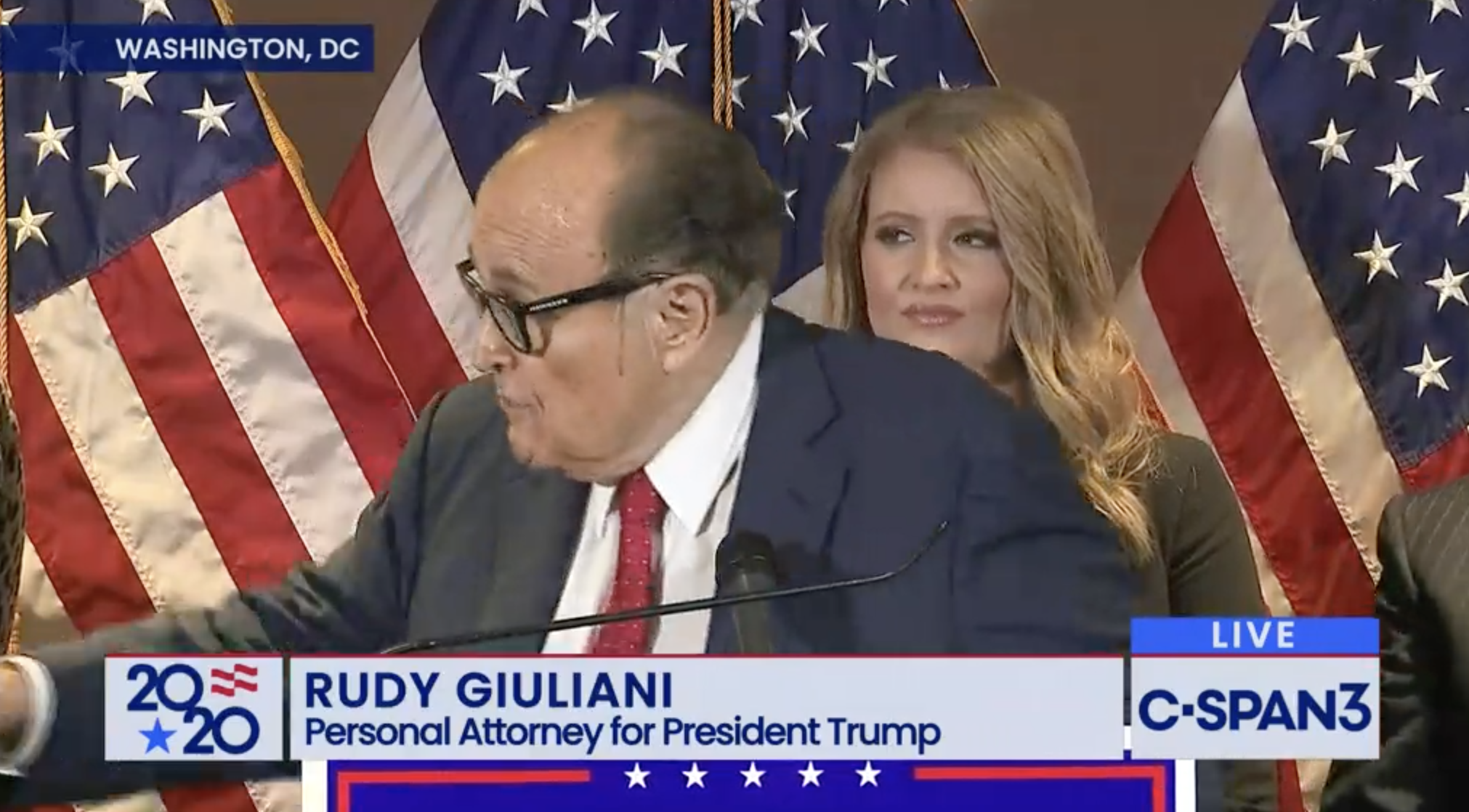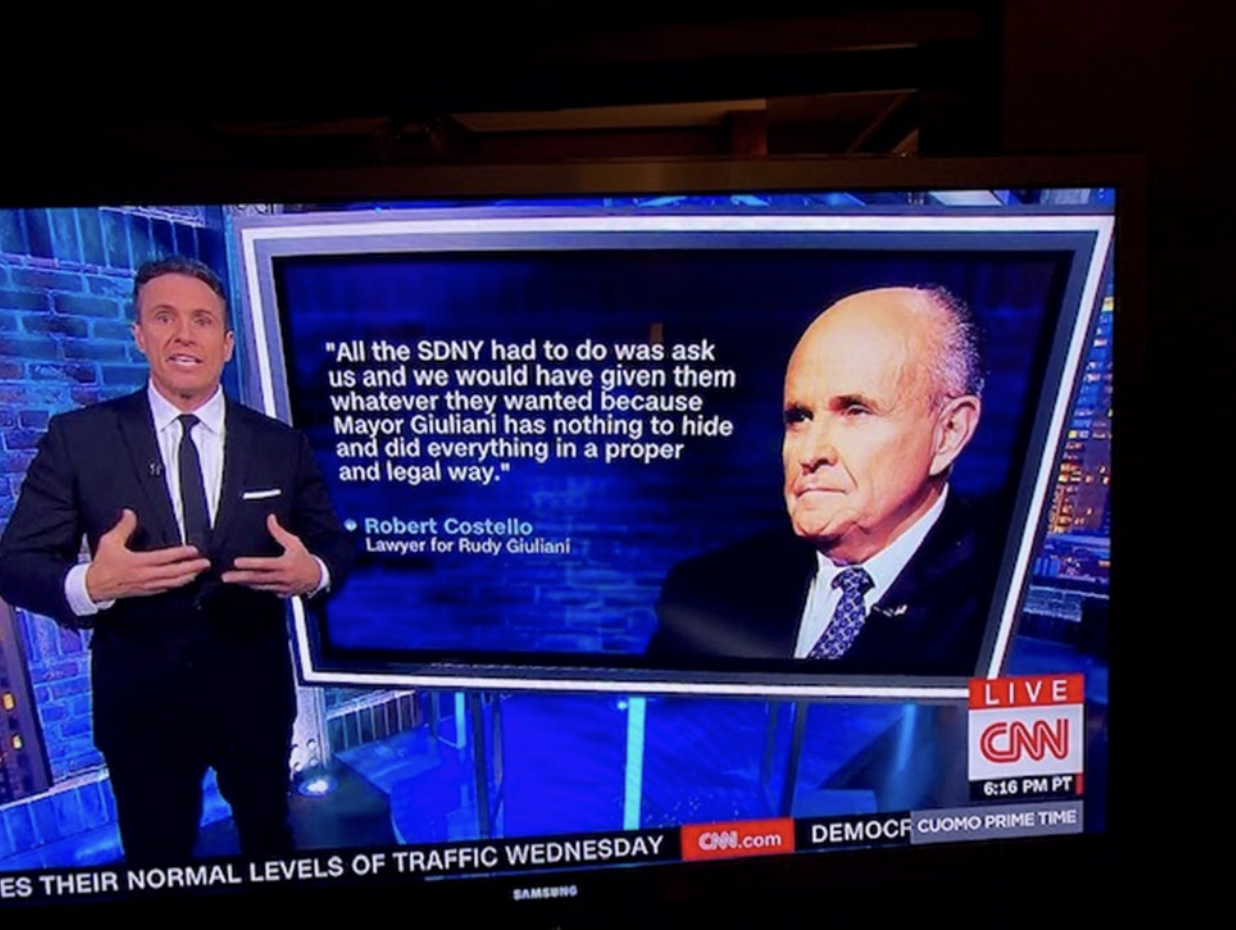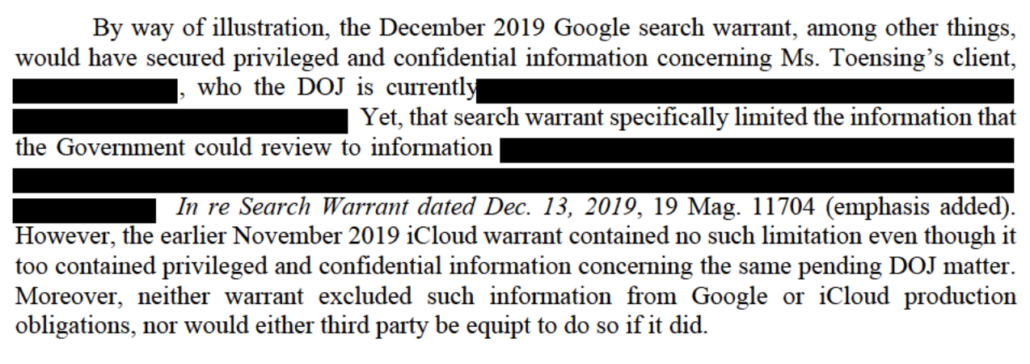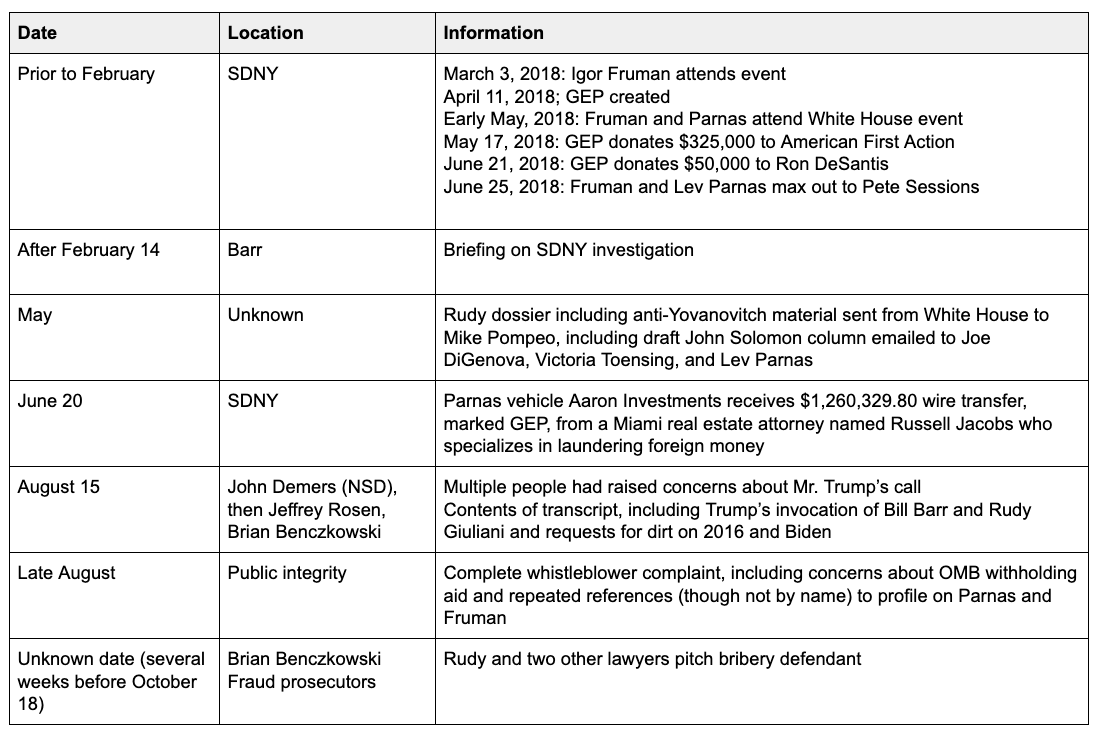Rudy Giuliani’s Alleged “Cooperation” Is a Threat to Lay out How Bill Barr and Jeffrey Rosen Protected Russian Disinformation
Now that I’ve waded through Rudy Giulilani’s response to learning that SDNY had conducted a covert search on him in November 2019 before it conducted an overt search in April 2021, I’m certain Rudy engaged in just the kind of bad lawyering SDNY hoped he would — more on that in a week or so.
But a big part of his letter was not an attempt to engage in good lawyering, but instead to send messages to a variety of people. He provided co-conspirators a map they can use to understand which of their communications are in SDNY’s hands, and which are not. But he also laid out what he called his “cooperation,” which aside from minimal claims (which SDNY disputed) to have cooperated with SDNY against Lev Parnas and Igor Fruman, really amounts to the corrupt stuff he believed he was protected for because he did it on behalf of Donald Trump. Indeed, he claims that if Judge Paul Oetken only knew he had permission to do all this stuff, then he wouldn’t have approved the warrants against him.
It is unknown if the Government informed the Court of Giuliani’s cooperation with the State Department or his offers to cooperate with the SDNY or his actual cooperation with the Western District of Pennsylvania.
His first claim of “cooperation” revisits claims he made in the wake of the whistleblower complaint in 2019, claiming that he was working closely with State when he was lobbying to fire Marie Yovanovitch.
It was premature and unwarranted for the Government to seize Giuliani’s ESI because Giuliani had already cooperated with the US State Department (“State”) through Mike Pompeo, the Secretary of State, in March 2019 concerning Ukraine. He also cooperated again in July and August of 2019 at the request of the State Department in assisting them with regard to Ukraine.
This is almost certainly the meat of the SDNY investigation, and whatever else Rudy has done by invoking it, he has put Mike Pompeo on the hotseat.
It may not be a coincidence that in the wake of this letter, Gordon Sondland sued Mike Pompeo for covering up what really happened in State in 2019 and provided several excuses — most importantly, that Pompeo refused to let him access his own backup materials before testifying — for why his two existing sessions of sworn testimony might conflict with what SDNY seized from Rudy.
In his other claim of cooperation, Rudy detailed how he shared disinformation from Russian agent Andrii Derkach with DOJ, which he described as “cooperation” with Main Justice in the guise of its delegate, Pittsburgh US Attorney Scott Brady.
Before I repeat Rudy’s description of how he shared disinformation from Andrii Derkach with a hand-picked and very pro-Trump US Attorney, consider several details: first, immediately in the wake of the raid on Rudy in April, there were leaked explanations for how Rudy managed to meet with a known Russian agent — right in the middle of impeachment!! — even though both National Security Advisor Robert O’Brien and FBI’s Counterintelligence folks knew that Russia was feeding Derkach disinformation to feed to Rudy.
The WaPo originally reported that the FBI had warned Rudy, but had to retract that. Rudy never got warned.
Correction: An earlier version of this story, published Thursday, incorrectly reported that One America News was warned by the FBI that it was the target of a Russian influence operation. That version also said the FBI had provided a similar warning to Rudolph W. Giuliani, which he has since disputed. This version has been corrected to remove assertions that OAN and Giuliani received the warnings.
The FBI became aware in late 2019 that Rudolph W. Giuliani was the target of a Russian influence operation aimed at circulating falsehoods intended to damage President Biden politically ahead of last year’s election, according to people familiar with the matter.
Officials planned to warn Giuliani as part of an extensive effort by the bureau to alert members of Congress and at least one conservative media outlet, One America News, that they faced a risk of being used to further Russia’s attempt to influence the election’s outcome, said several current and former U.S. officials. All spoke on the condition of anonymity because the matter remains highly sensitive.
The FBI became aware of the Russian information operation at a time when Giuliani was deeply involved with former president Donald Trump’s 2020 reelection campaign and related activities in Ukraine to surface unflattering or incriminating information about the Biden family.
[snip]
In late 2019, before Giuliani’s trip to Kyiv, U.S. intelligence agencies warned the Trump White House that Giuliani was the target of a Russian influence operation, as The Post reported last year. Officials became concerned after obtaining evidence, including communications intercepts, that showed Giuliani was interacting with people tied to Russian intelligence. The warnings led then-national security adviser Robert C. O’Brien to caution Trump that any information Giuliani brought back from Ukraine should be considered contaminated by Russia.
Then, after matching the WaPo’s original story and similarly having to retract it, NBC offered an explanation why Rudy wasn’t given that briefing: because it would “complicate” what NBC called “the criminal investigation” into Rudy.
The FBI prepared a so-called “defensive” briefing for Rudy Giuliani in 2019 in which agents were poised to warn him he was being targeted by a Russian intelligence influence operation as he sought to gather opposition research on the Biden family, according to a source familiar with the matter.
But that briefing was not given, according to a second source familiar with the matter, because of concerns that the briefing could complicate the criminal investigation into the former New York City mayor.
Yet, at the time Rudy would have gotten this warning, SDNY had already shown probable cause Rudy was an agent of one or another pro-corruption Ukrainians, almost certainly Yuri Lutsenko in his efforts to fire Marie Yovanovitch. Without a Derkach angle to the SDNY investigation — an angle Jeffrey Rosen went to great lengths to prevent them from pursuing — it’s not clear how it would have complicated that investigation.
Rudy didn’t get his warning and instead of warning him, Trump said that was Rudy being Rudy. So Rudy first met with Lutsenko, the subject of the first investigation, and headed from that meeting directly to meet with Derkach.
A month later, Rosen issued a memo prohibiting any prosecutors from expanding the scope of their already opened investigations, which would have had the effect of preventing SDNY from investigating Rudy’s ongoing influence peddling for known Russian agent Andrii Derkach, about whom FBI decided not to warn Rudy even though everyone briefed on it knew it was a Russian intelligence operation.
But that wasn’t the only thing that Billy Barr and Rosen’s efforts to divvy up Ukrainian investigations did. After Rosen wrote that memo (ensuring no one could start an investigation into Rudy’s dalliances with Derkach), but still a week before Trump was acquitted for coercing dirt from Ukraine to use against Joe Biden, per Rudy’s timeline, Barr assigned Pittsburgh US Attorney Scott Brady to oversee intake of all Ukrainian dirt and, within a day, Rudy was in the business of sharing Derkach’s dirt directly with Pittsburgh’s US Attorney’s office.
In his letter, Rudy clearly identifies four of the nine people who rushed to accept Rudy’s dirt, which the government had identified as Russia disinformation before he went to collect it in December.
[I]n January 2020, counsel for Giuliani contacted high officials in the Justice Department, to inform them that Giuliani wanted to provide evidence for their consideration about the Ukraine. Within a day, the United States Attorney for the Western District of Pennsylvania, Scott W. Brady, contacted Giuliani’s counsel and offered to hold a meeting in Pittsburgh with both the United States Attorney’s office personnel and the FBI. Mayor Giuliani immediately accepted, and a meeting was scheduled for January 29, 2020.
On January 29, 2020, Mayor Giuliani and his counsel, flew to Pittsburgh at their own cost, where they were met by agents of the FBI and transported to FBI headquarters in Pittsburgh. Present at that meeting were the United States Attorney, the First Assistant United States Attorney, the Chief of the Criminal Division, and two additional Assistant United States Attorneys (“AUSA’s”) from the Western District of Pennsylvania. The FBI was represented by the Special Agent in Charge (“SAIC”) of the Pittsburgh FBI, the Assistant Special Agent in Charge (“ASAIC”), and three other special agents of the FBI.
Prior to the meeting, Giuliani’s counsel had provided the Pittsburgh United States Attorney’s office with documents and an extensive outline of the subject matter to be discussed, so that the Government could be fully informed and prepared to ask probing questions. Giuliani began the meeting by making a presentation with handouts. During his presentation, and at the end of it, the Mayor and his counsel answered every question they were asked, to the apparent satisfaction of all of the Government officials in the room. In addition to the presentation, Giuliani provided the Government with the names and addresses of individual witnesses, both in the United States and in Ukraine, that could corroborate and amplify the information that the Mayor was providing. Subsequent to that meeting, and covering a period of months, counsel for Giuliani received a number of inquiries, discussions and requests from the First Assistant United States Attorney. All requests were granted and all inquiries were answered. [my emphasis]
And, as Rudy tells it, that First AUSA kept coming back for more, a claim (like his other claims about the personnel involved) that matches a story published in the NYT after those involved knew that Trump had lost. That story also described that Brady kept pushing for inappropriate investigative steps until, ultimately, Seth DuCharme had to get involved.
Officials said that Mr. Brady almost immediately started pushing to take aggressive steps. He had a list of people he wanted F.B.I. agents to question. It was not clear whether they were the same witnesses that Mr. Giuliani and Mr. Costello had submitted, but a former law enforcement official said that Mr. Brady had wanted the F.B.I. to question people mentioned in Mr. Giuliani’s materials.
The steps were outside “normal investigative procedures,” one former senior law enforcement official with knowledge of the events said, particularly in an election year; Justice Department policy typically forbids investigators from making aggressive moves before elections that could affect the outcome of the vote if they become public.
The Pittsburgh F.B.I. office refused to comply without the approval of David L. Bowdich, the F.B.I.’s deputy director, the former official said.Mr. Brady’s demands soon prompted a tense confrontation with F.B.I. officials at the bureau’s headquarters in Washington. The meeting was mediated by Seth D. DuCharme, now the acting U.S. attorney in Brooklyn and at the time a trusted aide and ally of Mr. Barr’s at the Justice Department in Washington.
Then, after Barr failed to replace Geoffrey Berman with a hand-picked flunky when he fired him on June 20 of last year, Barr instead installed DuCharme in Brooklyn on July 10, thereby making DuCharme (who had already been personally involved in Pittsburgh) the gatekeeper on any investigations pertaining to Ukraine. And sometime months after that — as Rudy continued to share known Russian disinformation during the election — DuCharme approved not an expansion of the investigation in SDNY that Barr tried to shut down by firing Berman, which would have been the logical thing to do if you were concerned about Russians interfering in our elections, but instead a parallel investigation in EDNY that, per the more recent NYT report, by design would not treat Rudy as a subject. Meanwhile, Rosen created repeated roadblocks — higher and higher levels of approvals for a search of Rudy — in an attempt to prevent SDNY from advancing their investigation into Rudy any further.
There are some involved in this story, like the FBI Agents who got promoted into the jobs formerly held by Andrew McCabe and Bill Priestap and Peter Strzok, who probably let all this happen because they knew the best way to advance their careers was to not make the mistake that their predecessors had made by trying to keep the country safe from Russian interference during an election. Others may rationalize what they did as a means to placate the President, perhaps imagining that it wouldn’t do that much damage to the country — that was the excuse cited by the NYT article on the Pittsburgh investigation. But those people, in recognizing Trump would lash out if they tried to investigate Russian interference in the 2020 election, would have therefore understood that Trump wanted Russian spies to interfere in the election and would be furious if they prevented it. They would have had to have understood that the way to keep Trump happy was to let Russia have its way. They would have been operating on the recognition that all the claims about what Trump did in 2016 were true, at least as far as 2020.
Plus, no one who pushed as hard as Scott Brady did can claim to be trying to placate the President.
Finally, worst of all, there are those who took a vow to “protect and defend against enemies foreign and domestic” who made affirmative attempts to protect not just the disinformation that Rudy was feeding to DOJ and FBI, but also protect Rudy for serving as the willful handmaiden of someone they knew was a Russian spy.
The Russian scandal of 2020 is, in many ways, even more scandalous than the Russian scandal of 2016. At least Paul Manafort and Roger Stone were in a position to claim plausible deniability. Bill Barr and Jeffrey Rosen are not.
Update: This email obtained via American Oversight shows that the decision to use Scott Brady to protect the Russian disinformation intake started earlier, by January 3.


